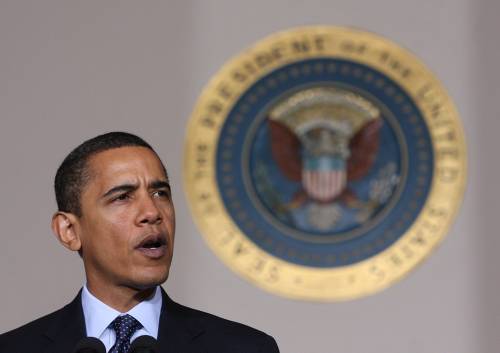Obama Announces New Interagency Interrogation Force
The announcement is the result of an Obama administration task force’s proposal -- first reported by The Washington Independent.
Jul 31, 2020200.1K Shares2.6M Views
President Barack Obama (WDCpix)
After months of deliberation about humane and effective ways of interrogating high-value terrorism detainees, the Obama administration announced on Monday that it would create a new interagency interrogation task force for extracting information from the most important terrorist suspects in its custody. Known as the High-Value Detainee Interrogation Group, the new team will draw on interrogators, intelligence analysts, linguists and cultural experts to interrogate detainees without torturing them, according to senior administration officials.
The unit, called HIG for short, will be housed in the FBI, although one senior administration official said on a conference call with reporters that the HIG’s primary function will be “intelligence gathering rather than law enforcement.” Its creation comes as the result of the work of a task force created by President Obama’s January executive order on interrogations and renditions, and the task force’s proposal to create the new HIG was first reported by The Washington Independent.
Illustration by: Matt Mahurin
The team, of unspecified size, will have authority to operate outside of the United States, but it will operate within the legal boundaries set by a U.S. Army field manualthat is supposed to comply with the Geneva Conventions. “The Task Force concluded that the Army Field Manual provides appropriate guidance on interrogation for military interrogators and that no other additional guidance is needed for others in the federal government who conduct interrogations,” a senior administration official said. “The practices and techniques identified by the Army Field Manual are currently used by law enforcement to provide adequate and effective means of conducting such interrogations.”
Physicians for Human Rights has objected to an annex the Bush administration added to the field manual, called Appendix M, that allows for a technique known as “separation” to isolate so-called “unlawful enemy combatants” from Geneva Conventions-protected detainees, in order to “prolong the shock of capture” and “decreas[e] the detainee’s resistance to interrogation.” It is unclear how the appendix will impact the Obama administration’s interrogations, since senior officials have said they no longer employ the “enemy combatant” term.
While no officials have yet been identified to run the new HIG, its chief will come from the FBI, with a deputy provided by the intelligence community. It will report to the National Security Council, allowing a variety of government agencies — including the Departments of State, Justice and Homeland Security — to provide what the senior administration official called “strategic guidance” to the group, but not operational direction. Under the Bush administration, the CIA operated a so-called “enhanced interrogation” program that subjected detainees to such techniques as waterboarding, confinement in a small box,prolonged sleep deprivation through the application of painful physical contortions, restriction of a detainee’s daily caloric intake, and other techniques long regarded as torture under international law.
Both the administration and the CIA insisted that the bureaucratic change did not amount to a demotion of the CIA. “The CIA is still going to play a very important role on the operational side,” the senior administration official said, calling it an “integral part” of the new HIG. Added George Little, a spokesman for the CIA, “The CIA has played a vital role in the work of the task force, and its substantive knowledge will be essential to interrogations going forward.”
A government official who spoke on condition of anonymity said that the CIA did not want to house the new interrogation unit. The agency’s conduct during the Bush administration’s “enhanced interrogation” program is the subject of a 2004 CIA inspector general’s report due to be released Monday and it is widely anticipated that Attorney General Eric Holder will soon announce a criminal investigation into the treatment of detainees in CIA custody. “They’re glad to be out of the long-term detention business,” the official said, adding that “in the future, the CIA will, as appropriate, participate in the questioning of terror suspects.”
On the conference call, two senior administration officials, who declined to be quoted by name, said that the HIG would have to determine on a “case by case” basis whether a detainee interrogated by the HIG would be brought to federal criminal trial, although unspecified “broad policy guidance” from the National Security Council would govern the precise relationship between interrogations, prosecutions and detentions. “I think that’s really about as much as you can say in the abstract,” said one official. “You need to drill into the particulars of the case to know how to best work the case going forward.”
A second official said the consideration for the Obama administration was “the best way to gather the information that we need to keep the country safe and protect national security. Sometimes that’s done by a law enforcement approach or by a prosecution and sometimes it’s not.”
The recommendation for creating the new interrogation unit, first reported by The Washington Independent, drew heavily from a proposal given to the task force in the spring by three security experts: Philip Heymann, a former deputy attorney general, forensic psychiatrist Robert Fein, and former CIA official John MacGaffin. The three, who contribute to a government advisory body called the Intelligence Science Board, recommended drawing a team together from the best interrogators from across the government to employ the best proven interrogation techniques for eliciting information humanely, and to create an institutional study of available social science information to inform interrogations. Both proposals were embraced by the task force, and one of the senior administration officials on the conference call praised the Intelligence Science Board’s work as “very thorough.”
The interrogations task force that recommended creating the new interrogation unit was chaired by Holder and co-chaired by Dennis Blair, the director of national intelligence and Bob Gates, the secretary of defense. It was run by J. Douglas Wilson, chief of the National Security Unit in the U.S. Attorney’s Office for the Northern District of California. Holder released a statementsaying the HIG would “yield valuable intelligence and strengthen our national security” and pledged that “there is no tension between strengthening our national security and meeting our commitment to the rule of law.”

Paolo Reyna
Reviewer
Paolo Reyna is a writer and storyteller with a wide range of interests. He graduated from New York University with a Bachelor of Arts in Journalism and Media Studies.
Paolo enjoys writing about celebrity culture, gaming, visual arts, and events. He has a keen eye for trends in popular culture and an enthusiasm for exploring new ideas. Paolo's writing aims to inform and entertain while providing fresh perspectives on the topics that interest him most.
In his free time, he loves to travel, watch films, read books, and socialize with friends.
Latest Articles
Popular Articles

